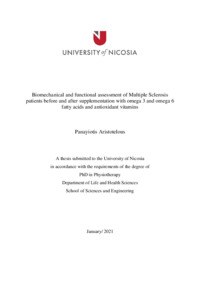- Aristotelous, Panayiotis
- School of Sciences and Engineering
- Department of Life and Health Sciences
- January 2021
- English
- 206 pages
- Giannaki, Christoforos | Stefanakis, Manos | Pattichis, Constantinos
- Multiple Sclerosis | Strength | Biomechanics | Gait | Functional Capacity | Quality of Life
- Sciences and Engineering -- Life and Health Science
-
-
Background: Multiple Sclerosis (MS) is a chronic, progressive inflammatory and neurodegenerative disease of the Central Nervous System (CNS) characterized by demyelination and axon loss resulting in a variety of motor symptoms and disabilities. The primary aim of the current study was to examine the effects of a 24 months supplementation (Neuroaspis PLP10) with a formula containing high dose of omega 3 and omega 6 polyunsaturated fatty acids and antioxidant vitamins on biomechanical and functional capacity parameters in PwMS. Secondary aims were to examine the effects of the above intervention in various quality of life and health-related parameters using the appropriate methodology.
Methodology: Fifty-one relapsing-remitting MS patients (age: 38.4 ± 7.1 yrs; 30 Female; EDSS: 2.38 ± 1.04) recruited and agreed to participate in this study. The assessment of muscle function in the upper extremities assessed using a handgrip dynamometer (Takei, Tokyo, Japan), while muscle function in the lower extremities assessed using an isokinetic dynamometer (model 770, CSMI Humac Norm, MA, USA). The evaluation of muscle fatigue assessed using an EMG (Trigno, Delsys, Natick, MA, USA). Spatiotemporal and kinematic parameters, such as the Gait deviation index (GDI) assessed using Vicon Nexus motion capture system (Vicon Motion Systems Ltd, Oxford, UK). Functional capacity examined using various functional tests commonly used in MS patients such as the six minutes’ walk test, two Sit to Stand tests and the Timed up and Go test. Finally, the patients’ health-related quality of life, sleep quality, depression, daily time sleepiness, cognition and fatigue levels evaluated using specific questionnaires. The treating neurologist clinically examined the expanded disability status scale (EDSS).
Results: The supplement had a positive effect in some spatiotemporal parameters of gait, such as the single support time (p<0.05), step and stride time (p<0.05) in the PLP10 group. Although due to the limited deviation from normal gait, there is small room for improvement, there were some promising positive changes in the spatiotemporal parameters. The supplement did not affect any of the kinematic parameters (p>0.05), in the sagittal, frontal and transverse plane. GDI showed some impressive group by time interaction. Precisely, while GDI of the placebo group decreases between the baseline and the 2 year follow up by about 10% on average across legs, the opposite happens in the PLP10 group. The GDI in the PLP10 group increased by about 4% on average across both legs in the same period (p<0.05). This outcome shows a promising significant positive effect of the medication in the gait of the PLP10 group. Moreover, the
II supplement had a positive effect on some tests of functional capacity such as the STS test (p<0.05). A tendency of more significant improvement in the PLP10 group in contrast with the placebo group was found on the 6MWT and the TUG test. In contrast, the supplement did not have any effect in handgrip strength (p>0.05), knee extension and flexion strength (p>0.05), or fatigue (p>0.05). In addition, the supplement did not affect any of the quality of life parameters such as fatigue, sleep quality, depression, daytime sleepiness and cognition in the PLP10 group (p>0.05). Finally, the disability scores remained stable in the supplement group (PLP10) over the two years intervention period.Conclusion: The effects of a 24 months supplementation with a formula containing high dose of omega 3 and omega 6 polyunsaturated fatty acids and antioxidant vitamins improved some spatiotemporal parameters of gait, GDI and some aspects of functional capacity whilst its maintained disability status. It seems that supplementation with a high dose of omega 3 and omega 6 free fatty acids could be a promising approach in terms of improving functional capacity, some gait parameters and maintain disability status in MS patients with low disability scores.
-


